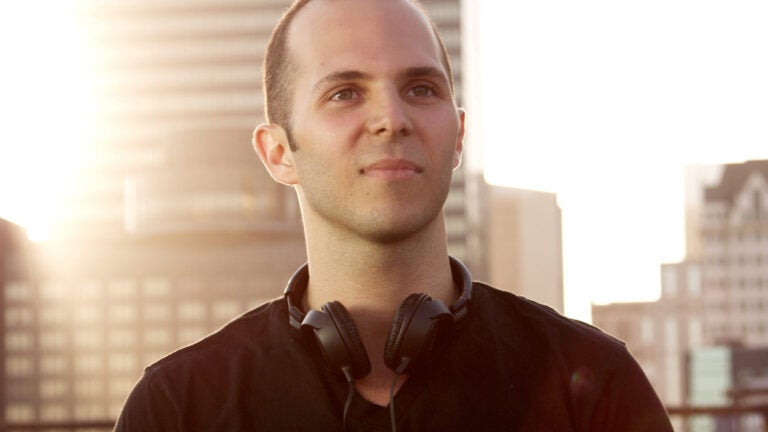
Alumnus takes adaptation of timeless Orwell essay to Tribeca Film Festival
Shooting an Elephant is a short based on the story seen as a metaphor for British imperialism
https://www.youtube.com/watch?v=HpljcOlk7is
Director Juan Pablo Rothie ’09 is taking his first project to the Tribeca Film Festival this week: a short film titled Shooting an Elephant.
Inspired by George Orwell’s timeless essay about colonialism and violence under pressure, Venezuelan-born Rothie brings Orwell’s words to life with an 11-minute short that captures the beauty of the story’s Burmese setting.
Rothie, who shot the film in Nepal, spent his teenage years living in India and the Philippines. He used his unique appreciation for those countries and cultures to inspire his representation of Orwell’s description of what was then colonial Burma.
“Growing up in third world countries and experiencing the kind of life Orwell describes in his stories gave me an understanding of the fragmented experience people face when they are outsiders in a world they don’t belong to,” Rothie said.
His first professional project
An Orwell fan while growing up, Rothie could not believe someone had not already translated the piece into film. After playing professional squash for a few years after graduating from the Bryan Singer Division of Cinema & Media Studies, Rothie knew he wanted to turn the material into his first project.
It took the filmmaker about a year of reaching out to various contacts to secure the rights to the essay. He finally connected with both Orwell’s estate and son, Richard Blair, who were receptive to the idea.
“They were both extremely supportive but also protective of the work; they had very strict guidelines on what could and could not be done,” Rothie said. “We luckily had similar artistic interest in the project. It was restricted but gave me certain parameters that finally allowed me to make the film.”
When Rothie realized the film was too big to take on alone, he reached out to Oscar-nominated writer Alec Sokolow (Toy Story), whom he had done research for throughout college and had kept in touch with ever since. Sokolow shared a similar passion for the Orwell story, which some scholars believe is based on the writer’s own experiences in Burma (now known as Myanmar), and the two became partners in re-creating the writer’s account.
Man versus elephant
The collaborators began production in May 2014 with actor Barry Sloane (Revenge) as the young protagonist enlisted to kill an aggressive elephant.
Rothie and his team anticipated an eight-day production schedule, but were limited to only three and a half days of shooting due to bad weather. Between using a production crew of predominantly Nepalese, working in a rural area that had never been documented and casting a pachyderm in a key role, Rothie’s experience was beyond anything he could have anticipated.
It was a huge learning experience for me on how to make movies.
Juan Pablo Rothie
“It was a huge learning experience for me on how to make movies,” he said. “It’s not necessarily what you want to do, but [a lesson in] working with the tools you have.”
While Rothie and his cinematographer had a prior understanding of working in the developing world, it was uncharted territory for their lead actor. Rothie said the unfamiliar location made Sloane’s performance raw, encompassing the emotion and integrity of Orwell’s original piece.
“He was acting what he was experiencing,” Rothie said. “He had actually become the outsider to a foreign place.”
A relatable tale
Rothie believes Orwell’s story, about an English police officer who does the job against his better judgment, is enduring and relatable because it questions the compromising positions humans constantly find themselves in and the impulses they follow to avoid looking foolish.
Though the piece is originally set during a time of colonialism, Rothie said it can easily be translated and applied to “any time egos are in the way and people feel the need to use violence as a solution.”
Rothie and Sokolow are eager to screen their film at Tribeca, having shown it at smaller film festivals like the Savannah Film Festival, where it won best historical short. The duo has already begun working on another project, which they hope to pitch during their time in New York.
Rothie is grateful for the success of this film that started with a risky idea he only dreamed of accomplishing.
“Tribeca is the perfect platform for our film,” he said. “Their stories really call to me and Alec, and I have been charged to bring our story there from the start.”
